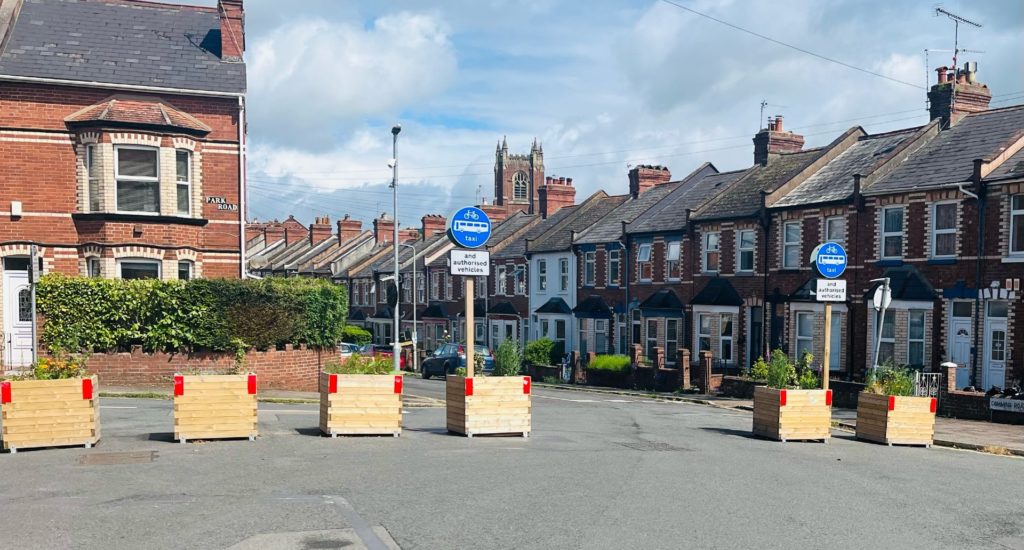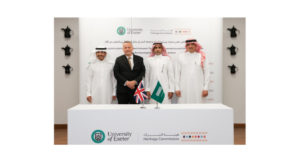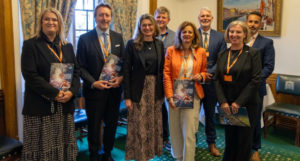Exeter researchers write to councillors over Active Streets Trial

University of Exeter researchers and educators have called on councillors to rely on “sound evidence” when making decisions on Exeter’s Active Streets Trial.
The trial aims to create a safer and more attractive environment for active travel, encouraging people to shift from car use to walking, wheeling and cycling. While a shift to active travel has many benefits, it helps reduce Devon’s carbon emissions and is stated as ambition in Devon’s Carbon Plan.
In a letter, 70 Exeter researchers and educators urge members of Devon County Council’s Highways and Traffic Orders Committee to base their decision on sound evidence. They note that “evidence-based decision making can be hard and must not lose sight of those affected”.
Therefore, in addition to conducting more rigorous analysis of traffic data, they suggest a Citizens’ Jury to capture benefits and problems citizens encounter, similar to the Devon Climate Assembly in 2021.
They add that: “It seems clear that without active intervention, Exeter’s traffic problems and associated emissions will only continue to increase.” The letter concludes: “We thank you for your hard work for Exeter and wish you the courage to make Exeter a great city to live in for all.”
Here is the letter in full:
Dear Councillors,
Please base your decisions on the Active Streets Trial on sound evidence.
We are a group of Exeter-based researchers and educators in a range of fields. We look at data, interpret it, and put them in a wider context; some of us use data to inform policy. We are also citizens and people who know from experience that evidence-based decision making can be hard and must not lose sight of those affected.
We are writing to urge you to ensure that decision-making around the Heavitree and Whipton Active Street Trial (AST) is soundly based on good-quality evidence, including reliable evidence on public views on the trial, and that the decision-making considers all citizens, current and future. We also urge that decisions remain consistent with existing policies that aim to protect citizens.
Both Devon County Council (DCC) and Exeter City Council (ECC) have declared a Climate Emergency in recognition of the threat posed by climate change to the citizens of Devon and Exeter. DCC have committed to facilitating the reduction of Devon’s carbon emissions to net-zero by 2050 at the latest and are taking a leading role in the Devon Carbon Plan. The Devon Carbon Plan has a clear ambition to increase active travel, stating:
“If we just substituted existing vehicles with electric and hydrogen alternatives and maintained our current behaviours, we would miss a once-in-a-generational opportunity to achieve the health and wellbeing benefits and transformational changes to our town and city centres that an increased use of active and public transport could bring. By making it easier and more attractive for everybody to use sustainable transport we will be more active, which will help address the obesity crisis, and air quality will be improved, helping reduce rates of respiratory and cardiovascular disease.”
Any decisions on the AST must therefore be taken with this established policy context in mind.
As noted in previous reports by DCC officials to HATOC, Low Traffic Neighbourhoods (LTNs) such as those being trialled in Heavitree and Whipton have been shown to be beneficial for reducing travel volumes. Further co-benefits include reductions in localised noise and air pollution and access to streets for children to play. And indeed, the data in the latest report to HATOC, and other data from the trial not highlighted in the report, already show beneficial effects in reducing traffic numbers and increasing cycling.
However, to properly assess the effect of the AST, it needs detailed consideration of its evolving impacts over time, not just averages which can give a false impression. Moreover, it needs time to fully take effect, especially since the initial implementation has been repeatedly sabotaged. It is crucial that the AST be continued for the full 18 months possible in order to allow proper evidence on its success in facilitating shifts in transport choices. In particular, it is critical that the results of the trial are not compromised by the traffic-reduction measures having been illegally removed or ignored, as has been the case for much of the trial period so far. The trial results can only be considered reliable when the traffic-reduction measures are properly in place and obeyed.
One possible impact of the AST is traffic on boundary roads. It is vital that all factors are taken into account when seeking to explain changes in traffic numbers, rather than automatically concluding that the AST is the only influence. Any changes during the trial period need to be looked at in the context of longer-term trends driven by other factors, particularly the ongoing increase in population within and near Exeter and the associated increase in commuter traffic into the city.
The recent consultation has resulted in a very large number of submissions, and as expected, included views on the benefits of the LTN as well as helping to identify concerns over unwanted side effects of the current implementation. We urge you to look at the data critically, and in particular, check whether feedback from individuals is supported by evidence. If they are, then ways to address them without losing sight of the original aims of the trial should be pursued. The consultation responses should feed into decision making in line with existing policy and evidence discussed above.
As it is local people who are affected, decision making needs to take into account views of the public, which include all forms of response, including support and opposition. This is not trivial to capture. There is much evidence from other LTNs and similar issues faced in local decision-making that consultation tends to only capture a small number of the most vocal opinions without truly reflecting the range of local opinions. Crucially, we note that the latest report to HATOC acknowledges its weaknesses in estimating the number of individuals who have responded and does not consider whether responses were from people affected by the scheme. Without a robust methodology behind it, it cannot be considered reliable as an indicator of public opinion. Hence we strongly suggest implementing rapid and rigorous collection of comprehensive information to inform any decision through tried and tested techniques to better understand and, importantly, quantify the impact on local people.
We suggest a deliberative process with a rigorous and independent collation of information, for example through a Citizen’s Jury, which has been shown in many other circumstances to be superior in quality of information and uncovering the range of views that captures benefits and problems during the remainder of the trial period, so that any problems can then be actively addressed. Indeed, this method was already very successfully used by Devon County Council and the University of Exeter in the Devon Climate Assembly in 2021, to inform the development of the Devon Carbon Plan.
We also encourage full transparency by making data and methodologies accessible for public review, thereby fostering trust and allowing for more informed and nuanced community feedback.
Given the well-established needs and benefits of the Devon Carbon Plan’s goals to increase active travel, we strongly believe going back is not an option. We urge you to use the consultation results as a starting point to addressing unwanted side effects of the LTN. These may be local tweaks, but importantly should include an ongoing systematic change in urban infrastructure, which will achieve the goals above and provide convenient and affordable mobility for all. It seems clear that without active intervention, Exeter’s traffic problems and associated emissions will only continue to increase.
Decision-making based on evidence is hard but pays off in the long term. Please ensure that proper, thorough evidence is obtained on the impact of the AST on citizens; and follow the evidence that we need to act and use data to understand how to create change that benefits all. We are convinced that you can count on the help of the local community supporting their neighbours to adapt and address side effects of the necessary changes.
We thank you for your hard work for Exeter and wish you the courage to make Exeter a great city to live in for all.
Signing in personal capacity:
Wolfram Moebius, Senior Lecturer, University of Exeter
James Dyke, Associate Professor Earth System Science, University of Exeter
Raphaëlle Haywood, Senior Lecturer, Physics & Astronomy, University of Exeter
Dr Joseph Clarke, Postdoctoral Research Associate, University of Exeter
Nell Hartney, Department of Mathematics and Statistics, University of Exeter
George Datseris, Marie Sklodowska-Curie Fellow, Mathematics and Statistics, University of Exeter
Professor Lucy Rowland, Professor, Dept. of Geog, University of Exeter
Ted Feldpausch, Professor, Dept. of Geography, University of Exeter
Professor Toby Pennington, Dept. Geography, University of Exeter
Dr Femke Nijsse, Geography, University of Exeter
Mike O’Sullivan, Lecturer, Maths Dept, University of Exeter
Dr Paul Bowen, Postdoctoral Research Associate, Dept. of Mathematics and Statistics, University of Exeter
Dr Catherine Butler, Associate Professor, Dept. of Geography, University of Exeter
Prof. Rolf Aalto, Associate Professor, Dept. Geography, University of Exeter
Prof Saffron O’Neill, Professor, Dept. of Geography, University of Exeter
Danny McCulloch, PhD student, Department of Mathematics and Statistics, University of Exeter
Kees Jan van Groenigen, Associate Professor, Dept. of Geography, University of Exeter
Dr Leila Dawney, Associate Professor, Dept. of Geography, University of Exeter
Professor Steve Hinchliffe, Professor of Geography, Geography and Centre for Cultures and Environments of Health, University of Exeter
Dr Jacob Maddison, Postdoctoral Research Fellow, Dept. of Mathematics and Statistics, University of Exeter
Prof Travis Coan, Associate Professor in Computational Social Science, University of Exeter
Veronica White, PhD researcher, Dept. of Geography, University of Exeter
Dr Britta Kuempers, Postdoctoral Research Fellow in Biosciences, University of Exeter
Ignacio del Amo, PhD candidate Mathematics and Statistics, University of Exeter
Ruth Chapman, PhD student, Mathematics and Statistics, University of Exeter
Dr Andrew Cunliffe, Senior Research Fellow in Geography, University of Exeter
Dr. Stephanie Hay, Postdoctoral Research Associate, Dept. of Mathematics and Statistics, University of Exeter
Prof Robert Beare, Associate Professor, Dept. Mathematics and Statistics
Toby Jones, PhD Student, Dept. Mathematics and Statistics
Daniel Williams, PhD Student, Dept. Mathematics and Statistics
Charles Turrell, PhD student, Dept. Mathematics and Statistics
Dr Neill Mackay, Postdoctoral Research Fellow in Geography, University of Exeter
Dr Eliott Rooke, Lecturer, Dept. of Geography, University of Exeter
Dr Timothy Malone, Research Fellow Royal Devon and Exeter Hospital and University of Exeter Medical School
Isobel Parry, PhD student, Dept. Mathematics and statistics
Dr Jo Snöälv-Cunliffe, Graduate Research Assistant, Dept. of Geography, University of Exeter
Dr Barend van Maanen, Associate Professor, Dept. of Geography, University of Exeter
Dr Reza Zamani, HLS, Medical School, University of Exeter
Thomas Wilkinson, PhD Student, Dept. Mathematics and Statistics
Dr Paul Kerr, Consultant haematologist Royal Devon and Exeter Hospital and University of Exeter Medical School
Cecilia Manosa Nyblon, Director We Are the Possible, University of Exeter
Dr Richard Oram, Associate Professor in Diabetes and Nephrology University of Exeter, and Honorary Consultant Nephrologist Royal Devon and Exeter Hospital. X X
Prof. Patrick Devine-Wright, Geography and Global Systems Institute, University of Exeter.
Professor Neil Adger, Geography and Global Systems Institute, University of Exeter
Dr Stefan Siegert, Senior Lecturer in Statistics and UKRI Policy Fellow, University of Exeter
Professor David Stephenson, Director of Exeter Climate Systems, Department of Mathematics and Statistics, University of Exeter
Josie Ashe, Graduate Research Assistant, PhD student, Dept. of Geography, University of Exeter
Dr Sally Flint, Creative Lead, We Are the Possible, Green Futures, University of Exeter
Amanda Goodison, Research Facilities Administrator, Technical Services/HLS University of Exeter
Professor Karen Bickerstaff, Dept of Geography, University of Exeter
Professor Ilya Maclean, Environment and Sustainability Institute, University of Exeter
Professor Katrina Brown, Emerita Professor, University of Exeter
Emily Doyle, PhD Candidate, Geography and Global Systems Institute, University of Exeter
Dr Sally Rangecroft, Dept of Geography, University of Exeter
Dr Timothy Lam, Centre for Doctoral Training in Environmental Intelligence, University of Exeter
Dr Jesse F Abrams, Senior Research Impact Fellow, Dept of Geography, University of Exeter
Dr. Rebecca Sandover, Lecturer, Dept of Geography, University of Exeter
Cameron Clark, Senior Research Technician, Dept of Geography, University of Exeter
Dr Jo Hamilton, Lecturer, Dept. of Geography, University of Exeter
Dr. Dunia H. Urrego, Associate Professor, University of Exeter
Jamie Atkins, PhD Student, Dept of Geography, University of Exeter
Dr Matthew Priestley, Research Fellow, Dept. of Mathematics and Statistics, University of Exeter
Dr Alex Hamilton, Senior Clinical Tutor, University of Exeter Medical School
Professor Nicola Thomas, Department of Geography, University of Exeter
Dr Steven R. Smith, Research Impact Fellow, Department of Geography, University of Exeter
Dr Arwen Nicholson, Research Fellow, Dept. of Physics & Astronomy, University of Exeter
Dr Rudy Arthur, Senior Lecturer, Dept. of Computer Science
Dr Lewis Winks, Research Fellow, Geography
Dr Georgie Bennett, Associate Professor, Dept. of Geography, University of Exeter
Ian Burton, PhD Student, Environmental Intelligence CDT, University of Exeter



